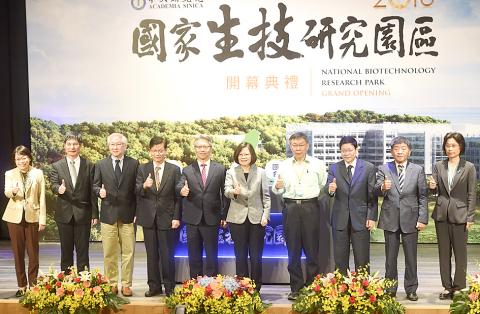President Tsai Ing-wen (蔡英文) yesterday inaugurated the National Biotechnology Research Park in Taipei’s Nangang District (南港), saying its opening marks a giant step in the development of the nation’s biotech industry.
The park houses the Ministry of Health and Welfare’s Food and Drug Administration, the Ministry of Science and Technology’s National Laboratory Animal Center, the Ministry of Economic Affairs’ Development Center for Biotechnology, an incubation center, two Academia Sinica research centers and a bioinformatics center.
While some of the agencies moved in last year, the park’s inauguration had been put off several times.

Photo: Chien Jung-fong, Taipei Times
With Academia Sinica leading the project and a budget of more than NT$20 billion (US$646.4 million), the park was set up on a site that used to house the Ministry of National Defense’s 202nd Arsenal.
“Taiwan’s essential competitiveness in the next generation will stem from the biotech and biomedical industries,” Tsai said in her speech at the opening, expressing her hope that the park would be connected with the Hsinchu Biomedical Science Park to form an industrial corridor.
Aided by the passage of amendments to the Fundamental Science and Technology Act (科學技術基本法) and the Act for the Development of Biotech and New Pharmaceuticals Industry (生技新藥產業發展條例) last year, the nation’s biotech industry should be able to attract more talented people, she said.
The project had been overseen by three former presidents — Lee Teng-hui (李登輝), Chen Shui-bian (陳水扁) and Ma Ying-jeou (馬英九) — as well as Tsai and Vice President Chen Chien-jen (陳建仁), Academia Sinica President James Liao (廖俊智) said, adding that two of the institute’s former presidents, Lee Yuan-tseh (李遠哲) and Wong Chi-huey (翁啟惠), also provided vital contributions.
Given environmental groups’ concern over the project’s potential impact on local species, the institution has restricted buildings to 3 hectares, while maintaining a 4-hectare ecological pool and reserving the rest for ecological restoration, Liao said.
The park is to be managed by a cross-agency committee, with Academia Sinica academician Andrew Wang (王惠鈞) serving as acting chief executive and National Taiwan University animal science professor Ding Shih-torng (丁詩同), who is also the director of the park’s incubation center, as its acting deputy executive.

CHAOS: Iranians took to the streets playing celebratory music after reports of Khamenei’s death on Saturday, while mourners also gathered in Tehran yesterday Iranian Supreme Leader Ayatollah Ali Khamenei was killed in a major attack on Iran launched by Israel and the US, throwing the future of the Islamic republic into doubt and raising the risk of regional instability. Iranian state television and the state-run IRNA news agency announced the 86-year-old’s death early yesterday. US President Donald Trump said it gave Iranians their “greatest chance” to “take back” their country. The announcements came after a joint US and Israeli aerial bombardment that targeted Iranian military and governmental sites. Trump said the “heavy and pinpoint bombing” would continue through the week or as long

TRUST: The KMT said it respected the US’ timing and considerations, and hoped it would continue to honor its commitments to helping Taiwan bolster its defenses and deterrence US President Donald Trump is delaying a multibillion-dollar arms sale to Taiwan to ensure his visit to Beijing is successful, a New York Times report said. The weapons sales package has stalled in the US Department of State, the report said, citing US officials it did not identify. The White House has told agencies not to push forward ahead of Trump’s meeting with Chinese President Xi Jinping (習近平), it said. The two last month held a phone call to discuss trade and geopolitical flashpoints ahead of the summit. Xi raised the Taiwan issue and urged the US to handle arms sales to

State-run CPC Corp, Taiwan (CPC, 台灣中油) yesterday said that it had confirmed on Saturday night with its liquefied natural gas (LNG) and crude oil suppliers that shipments are proceeding as scheduled and that domestic supplies remain unaffected. The CPC yesterday announced the gasoline and diesel prices will rise by NT$0.2 and NT$0.4 per liter, respectively, starting Monday, citing Middle East tensions and blizzards in the eastern United States. CPC also iterated it has been reducing the proportion of crude oil imports from the Middle East and diversifying its supply sources in the past few years in response to geopolitical risks, expanding

Pro-democracy media tycoon Jimmy Lai’s (黎智英) fraud conviction and prison sentence were yesterday overturned by a Hong Kong court, in a surprise legal decision that comes soon after Lai was jailed for 20 years on a separate national security charge. Judges Jeremy Poon (潘兆初), Anthea Pang (彭寶琴) and Derek Pang (彭偉昌) said in the judgement that they allowed the appeal from Lai, and another defendant in the case, to proceed, as a lower court judge had “erred.” “The Court of Appeal gave them leave to appeal against their conviction, allowed their appeals, quashed the convictions and set aside the sentences,” the judges